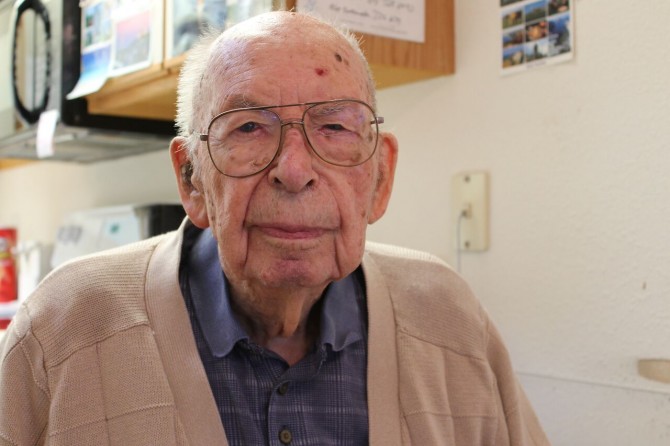At 107 years old, Olaf Larson keeps longevity a ‘secret’
By Blaine Friedlander
At 107 years old, Olaf Larson is Cornell’s oldest living faculty member. When asked to explain his longevity, the professor emeritus of rural sociology quipped: “That’s a secret.” And then he laughed.
Larson has heard that question before. “When I turned 100 years old people starting asking me, ‘What’s the secret?’ and every year they ask me the same question,” Larson explained. “So I decided to do some self-analysis.”
First, genetics is very important; he said his mother died at age 98.
Maintaining close relationships is also key. “Good family. That’s really important. … Have very close contact with them.” He speaks to his own sons often.
“Good friends,” said Larson. “I could go back in my whole career and … we had … very good friends.”
Add in consistent care. “Have good doctors. When I was at Cornell, I had the same doctor for 30 years. When I came down here [to Florida], I had the same doctor until she retired,” Larson said.
“Finally, good luck. That’s very important. I can think of a half-dozen times when I might not have been here, but I was lucky enough to escape those situations,” Larson said. “When I was quite young, I was riding in a car with a relative. The car stalled on railroad tracks with a passenger train coming, so there wasn’t any time to get out of the car, but the driver got the car started just in time. Otherwise we probably would have been smithereens.”
Larson celebrated his half-birthday in August, as he was born Feb. 26, 1910, in Fulton, Wisconsin. He resides at Waterman Village, a senior community in Mount Dora,
Florida, and is in the care of Cornerstone Hospice and Palliative Care.
Larson was a pioneer in the field of rural sociology. He served as president of the Rural Sociological Society, and in the early 1970s, he was director of the Northeast Regional Center for Rural Development. He still discusses the farming industry and his own research with his caregivers. Larson believes that family farms are a positive influence. “In general, people who work on farms have values that are important, values such as hard work and independence,” he said.
Larson’s sharp mind impresses people. “Mr. Larson’s recollection of dates, past career assignments and people he came across is mind-boggling,” said Selly Castillo, a Cornerstone social worker.
So sharp, in fact, he’s written and published two books after age 100: His 2011 autobiography, “When Horses Pulled the Plow” (University of Wisconsin Press), and the 2010 “Opening Windows Onto Hidden Lives: Women, Country Life, and Early Rural Sociological Research,” with Julie Zimmerman, Ph.D. ’97 (Penn State University Press).
Before joining the Cornell faculty in 1946 as associate professor of rural sociology (now called development sociology), he was an associate professor at Colorado State University and a regional leader with the Division of Farm Population and Rural Welfare for the U.S. Department of Agriculture’s Bureau of Agricultural Economics, where he conducted research on low-income rural families. From 1957 to 1966, he chaired Cornell’s rural sociology department.
David Brown, professor of development sociology, and Nina Glasgow, senior research associate in development sociology, visited Larson last year in Florida, said he enjoyed speaking to him about professional and academic topics – as well as life in the retirement village. Their meeting was remarkable, Brown said: “His mind is keen, completely intact.”
Media Contact
Get Cornell news delivered right to your inbox.
Subscribe